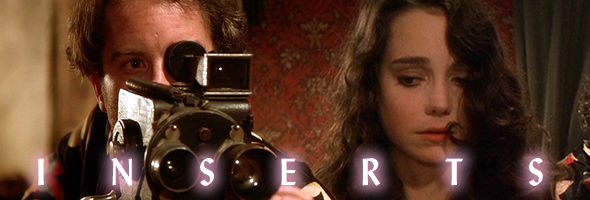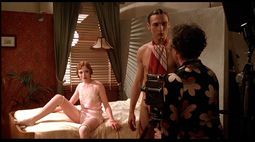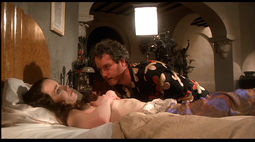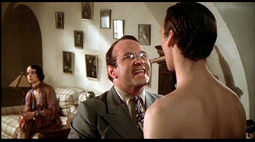
Color, 1975, 115m. / Directed by John Byrum / Starring Richard Dreyfuss, Jessica Harper, Veronica Cartwright, Bob Hoskins, Stephen Davies / MGM (US R1 NTSC) / WS (1.85:1) (16:9)
Wallowing in a booze-induced, impotent funk after going into a career tailspin, a former hotshot director dubbed the Boy Wonder (Dreyfuss) spends his days inside his Hollywood home shooting low-budget hardcore loops. On this particular afternoon, he prepares his female star, faded silent actress and current junkie Harlene (Cartwright), for a shoot with her tardy male co-star, "Rex the Wonder Dog" (Davies), a gravedigger-by-night who shows up with some bright ideas of his own to spice up their scene. The shoot is interrupted by the arrival of the film's financial backer, a hoodlum known as Big Mac (Hoskins), whose blushing girlfriend, Cathy Cake (Harper), tags along for the ride. When a nasty twist of fate sends Mac and Rex off on an errand, the Boy Wonder and Cathy are
Intelligent and entertaining, Inserts came along at a period when anything Old Hollywood was considered commercial poison (a fate also waiting for Day of the Locust and The Last Tycoon). Even the connection to porno chic didn't really apply here, as the film is most certainly more of a comedy than a skin flick. Cartwright, Harper and Davies have no problem baring their bodies for the camera, but the sex isn't really erotic in the traditional sense; the characters' verbal sparring is really the focus here and results in some delicious banter that accentuates the film's stage-like approach. Approaching this film as a nudie, late-night-cable romp like The First Nudie Musical is a huge mistake; instead this is more of a wistful study of Hollywood's darker side, a film ahead of its time more comfortable in the company of films like Gods and Monsters and Ed Wood. The stylish recreation of Golden Age Hollywood living gone to seed is nicely realized, with the sets and costumes evoking the period without resorting to rib-nudging pop culture references (apart from the presence of an offscreen "new kid" named Clark Gable). Often overbearing in commercial films, Dreyfuss is at least wisely cast here with his boyish mannerisms an effective counterpoint to the potential sleaziness of his profession. Both Cartwright and Harper
Initially released in American by United Artists in a truncated print running 97 minutes, Inserts appeared in Europe and eventually on US home video (from Key) in a longer, 115-minute cut (sometimes cited as 117 minutes, but it isn't). That full version is retained on MGM's DVD, which is thankfully much sharper and more vivid than the blurry, unwatchable Key tape, which smeared all of the powdery, flesh-like color schemes into nasty sludge. More significantly, the DVD restores the correct presentation of the film's second reel, which was presented with the image inexplicably flipped on the videotape version (resulting in the the label on Dreyfuss' liquor bottle appearing backwards!). The DVD's letterboxed presentation adds significantly to the sides of the image while shearing a tiny, insignificant bit from the top and bottom. The only extra is the original theatrical trailer, which shows what a tough sell this film was even to more perissive 1970s audiences.
Often cited as the film that put the nail in the coffin for X-rated major studio films, Inserts opened to mostly negative reviews and, despite the headlining presence of Richard Dreyfuss shortly after Jaws, made a swift departure at the box office. Fleetingly available on home video,
 it languished in obscurity but managed to cultivate a small cult following on the basis of its cast and novel premise. Though still well out of the mainstream, it's a film well worth seeking out for anyone with a taste for witty, dirty entertainment.
it languished in obscurity but managed to cultivate a small cult following on the basis of its cast and novel premise. Though still well out of the mainstream, it's a film well worth seeking out for anyone with a taste for witty, dirty entertainment.
 left alone to match wits and come up with their own method of completing his latest cinematic epic.
left alone to match wits and come up with their own method of completing his latest cinematic epic.
 match him in their respective single-act appearances; while the former has never really shied away from nervy roles, it's odd seeing Harper - fresh off of Phantom of the Paradise and soon to appear in Suspiria - in what constitutes the single longest nude scene in a studio film (well over half an hour!).
match him in their respective single-act appearances; while the former has never really shied away from nervy roles, it's odd seeing Harper - fresh off of Phantom of the Paradise and soon to appear in Suspiria - in what constitutes the single longest nude scene in a studio film (well over half an hour!).
